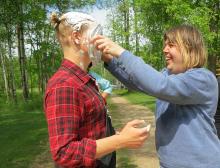Last semester I took a class at Canadian Mennonite University entitled Anabaptist-Mennonite Theology. The course aims to analyze the works of contemporary Anabaptist-Mennonite theologians to gain an understanding of what Anabaptist-Mennonite theology looks like in the church and world today.
On the final exam, Professor Paul Doerksen decided we were educated enough to answer the question: “What constitutes good Anabaptist-Mennonite theology?”
With the weight of an entire belief system resting on my shoulders, I scrawled something to the effect that “good Anabaptist-Mennonite theology should produce a community that looks like Jesus.” I’m not sure if this thesis statement was sufficiently nuanced for my professor. However, I needed to begin where I felt Anabaptism itself originated: by focussing on what it meant to follow Christ in all facets of daily life.
I often consign exam questions to the intellectual back burner as soon as I’ve completed a course, but the question, “What virtues or actions make a community or an individual look more like Jesus?” has remained active for me.
The question reminds me of my recent experiences working with people with disabilities. Whether steeped in the joy of adults with disabilities programs at Camps with Meaning, or challenged by the more mundane responsibilities of weekly respite shifts, I have encountered Christ’s presence in the people with and for whom I’ve worked.
During an adults with disabilities week at camp, I met a woman who shaped my summer. I first saw her doing a puzzle. I sat down with her and we “puzzled” as a pair.
As is customary and effective at adults with disabilities weeks, I made piles of less-than-funny jokes, prompting this woman to comment: “I don’t know about you, Mike.” Suddenly, this woman said to me with complete self-possession that she was blessed to be at camp. Everyone was kind to her and she wanted to return next year.
Later that week, she shared about her childhood. I began to understand why kindness felt so real to her at camp. The abuse that this woman grew up with left me speechless. She was a child with disabilities, and people exploited her vulnerability. At the end of the week, she stood up and said thank you to everybody for treating her with kindness and being there to support her.
Her experiences that week were the opposite of the mistreatment she’d dealt with in her life. Hers remains the most real word of thanks I’ve ever heard. Her miracle of gratitude was the product of God’s love as expressed through the community of faith.
Following a fruitful summer camp experience, I needed a part-time job to help pay for school. A friend of mine told me about a job that would involve respite work in the home of a man with cerebral palsy. I decided to apply. The job sounded appealing. I would hang out with someone my own age, go shopping, watch hockey and make meals.
The job has proven rewarding and I consider this man my good friend. The first few months, however, were full of difficult realizations. I had taken the basic human need to be comfortable and independent for granted. If I lie on my back at night and can’t fall asleep, I can simply turn on my side. If I want to send an e-mail to someone, I type it and click “send.”
If my friend needs to turn over, someone must wake up and help him. When he wants to send an e-mail, he dictates and his worker tries to express his thoughts. It was stressful to provide such an intense level of support for another human being.
Theologian John Swinton believes that disability is all about time. People with disabilities must complete tasks with a gentle slowness, which is the way God’s time works. The kingdom of God is not established quickly or efficiently, because gentleness is not about hands on a clock.
Working respite care has helped me realize that gentleness of true fellowship centres on being patient and accommodating. My respite friend has shown me patience while I’ve learned to ensure his comfort, and his patience has strengthened my resolve to better accommodate him.
In a community that looks like Jesus, we practise deep thankfulness. We accept and are accepted. We take time to be gentle. Working with adults with disabilities has equipped me to be gentler with my friends, classmates and family.
Perhaps this perspective is a slow walk, but along the way lie glimpses of God’s kingdom.
Mike Wiebe, 21, is a communications student at Canadian Mennonite University, Winnipeg. His home congregation is Altona Mennonite Church, Man.
—Posted Feb. 11, 2015





Add new comment
Canadian Mennonite invites comments and encourages constructive discussion about our content. Actual full names (first and last) are required. Comments are moderated and may be edited. They will not appear online until approved and will be posted during business hours. Some comments may be reproduced in print.